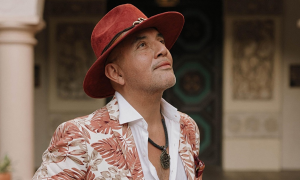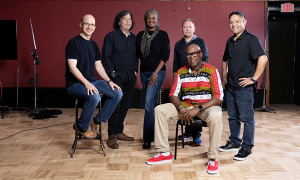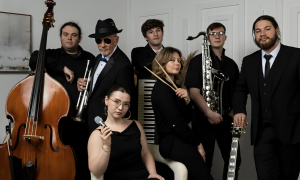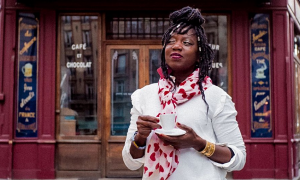Home » Jazz Articles » Take Five With... » Take Five with Thomas Manuel of The Jazz Loft
Take Five with Thomas Manuel of The Jazz Loft

Courtesy Peter Coco
Meet Thomas Manuel
Jazz historian, music educator and cornet player Dr. Thomas Manuel holds the endowed Artist in Residence chair within the Jazz department at Stony Brook University. In addition to this he serves as a trustee to the Frank Melville Memorial Foundation, is a member of the Huntington Arts Council Decentralization Advisory Committee, and is the founder and President of The Jazz Loft in Stony Brook, N.Y., an innovative and creative space which joins jazz performance, jazz preservation and jazz education in celebration of the past, present, and future.Manuel has been cited for his accomplishments by The New York Times, Downbeat Magazine, Newsday, Jazz Inside Magazine, Jazz Ed Magazine and has been actively involved with global educational outreach to Havana, Cuba, Monrovia, Liberia and Port Au Prince, Haiti. Manuel dedicates his professional efforts to both the preservation of Long Island's jazz history as well as presenting it to future generations and has received several honors for his dedication to the American born art form of Jazz including: Stony Brook Universities 40 Under 40 Award, several Suffolk Country Proclamations, the East End Arts & Humanities Council 2020 Music Masters residency, the 2019 Applied Improvisation Network International Conference artist presenter, and the 2016 Person of the Year in Brookhaven award from the Times Beacon Record.
Instruments:
I play the cornet and also sing.Teachers and/or influences?
I had so many teachers and influences, and I was so blessed as a young kid to work with so many of the greats that lived out here on Long Island, but the two people that I could really cite as my real mentors are,
Ray Anderson
tromboneb.1952

Warren Vache
cornetb.1951
I knew I wanted to be a musician when...
Ever since I was a kid. My mom loves to tell the story about how when I was in second grade I would line up my friends in our backyard and give them all sticks, and I'd be conducting and telling them to play and sing! I think ever since I heard music, I just wanted to create it. I didn't know how, but I knew by the time I was in fourth grade. My grandfather played cornet, and I wanted to play the cornet. Lots of people in my family played music too. Not professionally, but enough to give me the bug. it was just immediately that I knew music was my calling.Your sound and approach to music.
My sound to me is the most important thing. It's what I really feel is my gift and what I've been blessed with. My approach to music really always comes down to the fact that I believe that an emotion that expresses itself honestly and genuinely will always communicate powerfully. So that's my approach to music. When I get up to take a solo, sometimes I fall into the trap of being flashy or playing what I've been working on or some lines that I have. And I always remind myself when that happens, "No, if you actually want this to have some meaning, you need to open your heart and be honest and share what's inside because that's what's going to communicate and reach people." So that's my approach to music.Your teaching approach
I'm very passionate about this. I feel, first of all, teaching always needs to be a conversation. When I get in front of a class, even if I have 125 kids in front of me, I don't just lecture. I really believe it needs to be a conversation, and I always tell my students, "You have to ask questions. You need to dig deeper." I use the analogy of an onion and the layers. And I always ask them the question, "How do you know what you believe is true if you don't question what you believe?" And I try to engage them in conversation. Whatever the topic, I engage them to dig deeper. Even with papers, I always say, "Don't write a paper and just use books that have been written." I'll encourage them to find out who the author was, email the author, tell him, "Hey, I'm writing a paper for my jazz history class. I'm citing your book. Could I speak to you on the phone?" or, "Could I send you some questions?" Find the jazz musician's surviving family or someone who worked with them. If you don't like writing papers, which most students don't, it's because you're regurgitating material that's already been done before. Make the experience something NEW and now your paper produces new material that no one's had before. The new is exciting! That's a rewarding process. So I try and keep it fresh, to think outside the box and keep it very conversational. I strive for that by the time the class is done, they feel like, "Wow, I actually was a part of this. I contributed to this. I wasn't just the silent spectator."Your dream band
It changes. I just put a band together last week with a bunch of young kids that have been coming to our jam session here. They're all college music majors. A lot of them are from Freeport, and they have such fresh ideas. The bassist was older and he's from Iraq. I don't know if I'd say it was my dream band, but it's a great example of how I hear a band; hearing these individual voices that I thought were so creative, and then saying, "Man, I'd love to put them together and see what that produces." We had a little session here the other night and it was magical. I've always subscribed to the Woody Herman philosophy of running a band, which is to make sure that you're the worst guy in the band, and then your band will be amazing!Road story: Your best or worst experience
We could all write a book on that. Well, the one that comes to mind is before we all had cell phones, and you actually had to use a map and write directions to where you're going, I had a wedding in Essex, Connecticut. I was in Boston at the time, and we were driving, and I knew that it would take hours to get from Boston to Essex, Connecticut. So 45, 50 minutes later, I was getting off at Exit 7 for Essex, Connecticut. I get off the exit, and I know Essex is right on the water, but we're in farm country, and we're there way too soon! As it turns out I had driven the complete opposite direction.I had a big band at the time and had seven cars behind me, and we're all in tuxedos. I get off the exit, and there's this rinky dink gas station with farm animals. I go in, and I'm in a tuxedo, and this guy says, "Man, you're in the wrong state." I had driven the complete opposite direction to Essex, New Hampshire. "Oh crap." Now I realize, if I speed illegally, I might just make it to Essex, CT. on time and not ruin these peoples wedding. Now I'm doing 85 mph with seven cars following me, and I'm just waiting to get pulled over. Sure enough a State Trooper pulls me over and he's yelling at me. I took a big breath and I pleaded my case..., "Officer, I know I'm speeding, but it's someone's wedding. We went to the wrong place, and we were in New Hampshire. This is big band, and it's called The Black Tie Affair Orchestra, I don't want to ruin someone's wedding. I've never missed a gig in my life." He stopped me mid rant, looks at me and he says, "Follow me, put your blinkers on." He gave us a police escort and we made it to the venue on time with five minutes to spare!
Favorite venue
My favorite place to play locally out here on Long Island is the Harry Chapin Rainbow Stage, which is part of Heckscher Park. The Huntington Arts Council runs that, and their sound crew is absolutely unbelievable. The venue is so gorgeous, right there in the park on that pond. everybody's just so wonderful and warm and inviting. They have this incredible videographer and they just treat us so great.Your favorite recording in your discography and why?
Wow. That is a tough one. I have a recording that I did many years back, with my big band called the Kansas City Suite. It was music written by
Benny Carter
saxophone, alto1907 - 2003

Count Basie
piano1904 - 1984

Sarah Vaughan
vocals1924 - 1990

George Shearing
piano1919 - 2011

Teddy Charles
vibraphone1928 - 2012

Joe Wilder
trumpet1922 - 2014
What do you think is the most important thing you are contributing musically?
This is an awkward question to answer. I don't think about this much but now that you've got me doing so I'd say that the most important thing I'm contributing is honesty. Honesty is what makes anyone's music communicate and reach people. That's what it's all about.
Bill Evans
piano1929 - 1980
Did you know...
People don't know that I was a hardcore Lindy Hop dancer from coast to coast.It started when at one of my earliest gigs, a guy came up to compliment the band, but added that the band's tempos weren't right for dancing. I was so obsessed with my band and I wanted everything to be right. So I started attending some free dance lessons in nearby Port Jefferson at a place called the Driftwood Inn. At first I had no interest in dancing whatsoever, but then I fell in love with dancing and with Lindy Hop, swing dancing. I did my Master's thesis on the relationship between American vernacular dance during the 1930's and 1940's, and American popular music, which was Jazz. I fell head over heels in love with it. I wound up spending time uptown in Harlem, with Frankie Manning, who used to dance with Norma Miller and all those people that used to dance at the Savoy and invented the East Coast style of Lindy Hop. I spent my summers and vacations in Los Angeles and in Hollywood and I learned from all the west coast guys like Hal Takier, Johnny Mills, Jean Veloz and Bart Bartolo, and people that worked with Dean Collins. It's such a trip to think that I actually learned to dance right from the source. I watch movies on TCM and sometimes see my teachers in the background during the dance scenes. It's wild! I actually started competing on the national level with a partner and on a team.
The first jazz album I bought was:
I don't remember the first album I bought was, but I remember the first albums I got were from my library and it was
Tommy Dorsey
trombone1905 - 1956

Harry James
trumpet1916 - 1983

Bobby Hackett
trumpet1915 - 1976

Art Blakey
drums1919 - 1990
Music you are listening to now:

Les McCann
piano1935 - 2023

Eddie Harris
saxophone, tenor1934 - 1996

Sam Most
flute1930 - 2013

Dan Pugach
drumsKitty Parham: Kitty Parham & the West District Choir (Gospel Recordings)
Desert Island picks:

Frank Sinatra
vocals1915 - 1998

Billie Holiday
vocals1915 - 1959

Duke Ellington
piano1899 - 1974
Warren Vache &

Bill Charlap
pianob.1966

Chet Baker
trumpet and vocals1929 - 1988
How would you describe the state of jazz today?
Well, technically it's in the toilet, but what I believe is that there's this incredible opportunity to re-introduce jazz to people because it's gotten to an age where it is so old, I do believe it might as well be new again. The Jazz Loft recently had our first big band performance after 15 months of being shuttered, and there was a ton of people here that had never been here before. One couple that brought six friends said they had never heard big band music and they loved it. So I do believe that although statistically, it would look bleak, that there's an incredible opportunity to present and reintroduce jazz to people and for it to grow and thrive.I think the fact that a place like the Jazz Loft, in the middle of sleepy, Stony Brook, is packed for a big band concert, and packed the night before for a jam session, is encouraging. People are driving from a great distance and that's because of the music. I do think that the state of jazz today is poised to really thrive and grow and, and really speak to people.
What are some of the essential requirements to keep jazz alive and growing?
We need places to play it. We need more venues. I think that young people in schools today that are graduating from music school, should, in addition to learning their instruments, take classes on how to build a music venue, how to write contracts, how to start a not for profit, how to interact with community groups, how to write grants, how to collaborate and how to develop a concert series. I think we should teach them but also equip them with all those tools that could actually produce gigs for them and places to play those gigs. I think that some new approaches to jazz education is essential.Creating awareness is also critical. I really think what's essential to keeping jazz alive and growing is first of all, teaching people, what jazz is, then teaching them why it's important. I think if we do those two things that keeps the cycle going and growing and it keeps it alive.
What is in the near future?
I have two things that are exciting. I'm recording a duet album with guitarist Steve Salerno and we're kind of excited. We've been playing together for years and we have a real wonderful rapport with each other, but we especially wanted to record some tunes that are rather obscure and haven't ever been recorded. I am also working on a project called the Kennedy Dream Project, which is a studio orchestra ensemble that is also a collaboration with some composers. It brings the existing music of Oliver Nelson to the first half of the concert and then new compositions by myself and Ray Anderson, Dan Pugach, Oliver Nelson Jr. and Steve Salerno and Pete Coco to the second half. Chris Rinaman is doing some arrangements of my tunes for me. It's our statement on the last year and a half and where the world is at. We are going to be doing a performance at the Staller Center and a performance here at the Jazz Loft. We are also applying for a grant that will hopefully bring some other performances into underserved communities.What is your greatest fear when you perform?
My greatest fear when I perform is that I am not prepared. I always have this insecurity that I've not prepared enough.What song would you like played at your funeral?
Well, I can tell you this. I'm sure my funeral would be really awesome and I don't want to miss it. So I've already told my wife, I'm having my funeral before I die. So I'll be there playing and I'll let you know what songs we played when its over!What is your favorite song to whistle or sing in the shower?
When I'm singing in the shower, it's usually because I have to sing on a gig and I'm actually practicing for the gig. So, it's not as casual as that. I don't have much time. I have to utilize every moment I have.By Day:
I am the Artist in Residence at Stony Brook University in Stony Brook, N.Y.If I weren't a jazz musician, I would be a:
PreacherIf I could have dinner with anyone from history, who would it be and why?
Duke Ellington. He was so deep. Between the compositions, his performances, his skills as a bandleader-man, Duke is deep! That would be some dinner.Besides jazz, what is your favorite genre of music?
I really love opera. I love Puccini and I just love listening to opera stars. My tastes run pretty eclectic.. I love country Western, bluegrass and classical, gospel, but there's something about opera. I just put on Pavarotti and crank it up.Tags
Take Five With...
Thomas Manuel
AAJ Staff
Ray Anderson
Warren Vache,
Benny Carter
Count Basie
Sarah Vaughan
George Shearing
Teddy Charles
Joe Wilder
Bill Evans
Los Angeles
Tommy Dorsey
Harry James
Bobby Hackett
Les McCann
Eddie Harris
Sam Most
Dan Pugach
frank sinatra
Billie Holiday
duke ellington
Bill Charlap
Chet Baker
The Jazz Loft
Stony Brook, N.Y.
Comments
PREVIOUS / NEXT
Support All About Jazz
 All About Jazz has been a pillar of jazz since 1995, championing it as an art form and, more importantly, supporting the musicians who make it. Our enduring commitment has made "AAJ" one of the most culturally important websites of its kind, read by hundreds of thousands of fans, musicians and industry figures every month.
All About Jazz has been a pillar of jazz since 1995, championing it as an art form and, more importantly, supporting the musicians who make it. Our enduring commitment has made "AAJ" one of the most culturally important websites of its kind, read by hundreds of thousands of fans, musicians and industry figures every month.


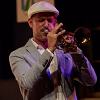





 Buy Now
Buy Now




